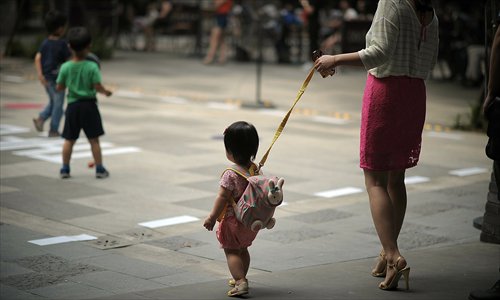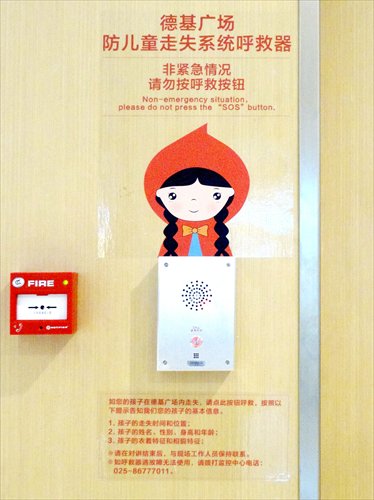Preventing child abductions
Mall launches pilot security system amid concern over missing kids

Photo:CFP

Photo:CFP
The tragedy of Wang Zhiqiang, a 13-year-old boy who disappeared in October 2014, has drawn widespread attention to the issue of missing children, and the lack of awareness and tools to tackle it among the public and the authorities.
The boy went missing near his home in Xinyang, Henan Province, on October 2. The police found him the next day, but his father was not informed until six months later, when the child died malnourished, according to the Xinhua News Agency. Wang's death was allegedly caused by negligent care.
The local government carried out an investigation and early this month punished a total of 18 people, including police officers, staff at the shelter where the boy stayed, and hospital doctors for mishandling Wang's case.
The investigation found the local public security bureau did not inform the district bureau promptly and update related information after receiving Wang's parents' call that their child was missing. Moreover, the police station did not do a DNA test and pass the information on to a central database.
Unknown scope
The case highlights the lack of attention the authorities have given the problem, and poor systems to deal with it. In fact, the anti-children trafficking department of the Ministry of Public Security (MPS) has not released the number of cases every year, although Chen Shiqu, head of the department, has denied that 200,000 children go missing each year, a number reported by cnr.cn in 2013.
There is also no official data on how many of the children are found.
Zhang Baoyan, the head of baobeihuijia.com, an online platform to find missing children, said that they received around 1,000 requests every year and most of the children were aged between three and six. Over half involve child abduction, she said.
"There are three types of situations when children are missing: being abducted, getting lost, and encountering accidents in which the body could not be found," Zhang told the Global Times. She said that in most cases, children go missing near their home, because public areas usually have surveillance cameras, deterring abductors.
A spokesperson surnamed Fan, of cnxr.net, another platform that traces missing children, said that abductions account for most missing children cases.
"Children were mainly deceived or snatched. Abducted children older than six would be ordered to steal things or beg," he said, citing the example of a 12-year-old boy from the Northeast China who was abducted near his home and taken to Shenzhen, Guangdong Province, to beg for money for more than a year.
"His parents gave him five yuan ($0.82) to buy something from the store nearby, and he did not return," he said. When volunteers found the boy, he was sick and abandoned. There were also bruises on his body.
Shopping mall alarm system
In order to protect children, a shopping mall in Nanjing, Jiangsu Province, launched an alert system on June 1 to prevent abductions, making it the first mall in China to adopt such a mechanism.
The mall, Deji Plaza, consists of one eight-story building and one 13-story building. Each floor has a telecommunication device near the escalator.
"Parents who find that their child is missing can use the devices to contact the security guards in the mall's control center. Parents describe the appearance of the child. The plaza will close all the entrances immediately and guards as well as shopkeepers will all help to look for the child," Jiang Ziren, the manager of the media department of Deji Plaza, told the Global Times.
"All areas of the shopping mall including toilets and car parks will be searched," he said. "We will also inform customers about the emergency situation. If the child could not be found in 10 minutes, police will take over the case."
The mall staff rehearsed five times before the system was launched, and during rehearsals, the missing child was found successfully in less than six minutes, according to Jiang.
Jiang added that the plaza hopes the system will be adopted by other public areas in the city.
Last month, the Zhongshe Social Work Development Foundation set up a mobile application that works similar to the Amber Alert system in the US. The application allows parents to call police immediately and inform other users about the missing child. The application would inform users within 16 kilometers in 10 minutes, and 250 kilometers in 30 minutes and so on. The information of the missing child will also be uploaded to the public security system. Through public participation and contacting police, the application enhances chances of finding the missing child.
Some parents are taking things into their own hands, giving their children wrist watches, shoes and jackets with built in GPS tracking systems.
Parents' awareness
Tong Xiaozun, vice director of the China Social Work Research Center at the China Youth University for Political Sciences, said that increasing parents' awareness is the key to prevent children from going missing.
"It is vital to train children to remember their parents' names and phone numbers and teach them not to follow strangers. Wearable items also help to prevent children from going missing. However, all these are meaningless when human traffickers intend to kidnap children," she said.
"Many parents allow children to play on their own. But as society becomes more urbanized and people's relationships are no longer as close as before, it is important that parents must not let their children walk away from their eyesight because danger could happen anytime," she added.
Tong suggested civil groups organize regular talks to parents on what to do in emergency situation and notify parents of possible dangers.
According to the MPS in 2010, parents whose children go missing should call the police immediately, and police officers should investigate at once.
DNA matching is one of the current methods Chinese police use to help parents find their missing children. The MPS announced in 2014 that over 3,500 children have found their parents successfully through the national DNA matching system since it was established in 2009.
Although it's important for parents to be aware of the risk of child abduction, they should also keep risks in perspective. For example, across China 200,000 children under 14 die from accidents every year, Workers' Daily reported in 2011, posing a far more concrete risk to children than child abductions.